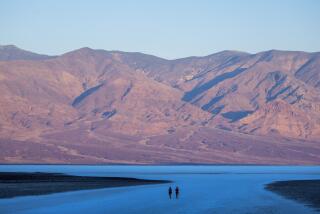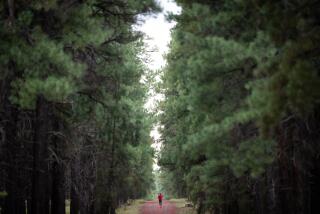Breathless Way Up in Leadville
- Share via
LEADVILLE, Colo. — Driving up the mountain, Karen Hirsheimer knows she’s nearly home when the potato chip bags explode.
“They go off like a bomb,” she said. “Suddenly there are chips all over the car.”
Exploding chip bags, cigarettes that snuff themselves in ashtrays, woozy mosquitoes and tepid boiling water are part of life in Leadville, America’s highest city.
At 10,200 feet, Leadville is twice as high as Denver. Once among the richest towns in the country, its silver, gold and lead mines drew thousands of rowdy prospectors, giving birth to the Guggenheim and May Co. fortunes.
The mines are empty now. The population, which peaked at 40,000 in the late 19th century, has dwindled to a steady 2,600, and many residents must commute to work in the ritzy resorts of nearby Vail. But Leadville’s stunning alpine scenery and Wild West flavor still appeal to hardy souls who savor the challenge of life on the roof of the nation.
These days the old mining center, which turned 125 this year, is a tourist town marketing elevation as its chief attraction. And with less atmospheric pressure available than at sea level, strange things happen here.
Bread doesn’t rise, golf balls fly farther and the high school track team, bursting with extra red blood cells, dominates cross-country running whenever it competes below.
At the local Safeway, ice cream pushes out of containers and vacuum-packed snacks sit like fat balloons on the shelves. Mosquitoes, should one arrive, are so groggy that locals admit feeling pity before swatting them.
“They are so slow you can see them coming,” said Andy Locke, a surveyor in town. “It’s almost sad.”
Leadville claims the highest airport, the highest golf course and the highest hotel rooms in the nation. On the way into town a huge “We Love Leadville -- Great Living at 10,200” is painted on a wall against the towering mountains.
Merchants hawk T-shirts saying “Got Oxygen?” Manhattan’s, a smoky bar in the center of town, bills its booze as the “High Altitude Thirst Aid.”
The elevation means dry air, so residents drink lots of water and urge visitors to forgo alcohol or at least compensate with just as much water.
At the Silver Dollar Saloon, Steve Grabowski, 45, knocked back a shot of tequila and ordered a beer.
“You gotta have a glass of water for every beer,” he counseled.
Asked if he followed this regimen, Grabowski, who pans for gold in local streams, looked perplexed.
“I have another beer for every beer I drink,” he said.
There are occasional challenges to the elevation crown.
A few years ago, the hamlet of Alma across rugged Mosquito Pass claimed it was 200 feet higher than Leadville.
“We say they were measuring from the top of their water tower,” said Leadville City Councilman Bud Elliot. “But they aren’t a city anyway; they may be the highest unincorporated village, but they aren’t a city.”
Elliot, 52, came to Leadville from Kansas City, Mo., 11 years ago, attracted by its size and good schools. He eventually quit smoking because whenever he put his cigarette in an ashtray, it fizzled out in the thin air.
“You have to keep it in your mouth, puffing all the time,” he said. “It was too much.”
It takes about six weeks to be fully acclimated to Leadville. Visitors immediately notice a dry mouth, shortness of breath and difficulty sleeping. A few flights of stairs, taken with ease 3,000 feet lower, feel like mountaineering here. Hotels stash oxygen behind the counter for gasping tourists.
Hirsheimer, 41, opened Cloud City Medical several months ago to sell oxygen to those battling altitude sickness. While many are tourists, she also provides oxygen to elderly residents who find breathing more difficult as they get older.
“There are people who are on oxygen their entire stay,” she said.
The town is a living laboratory for researchers studying the effects of altitude on humans.
“It’s not the concentration of oxygen up here that is different, it’s the partial pressure,” said Dr. Lisa Zwerdlinger, associate professor of medicine at the University of Colorado at Denver, who lives in Leadville. “Our pressure is 25% [less than] what it is at sea level so there isn’t that pressure of the atmosphere pushing oxygen into your lungs. Your body has to work harder to compensate.”
Zwerdlinger, 33, coordinates altitude research projects in town and has treated patients suffering from a wide array of elevation-induced ailments.
“I have seen people whose blood is so thick they don’t bleed,” she said.
When red cells get so densely packed, patients -- usually the elderly -- have pints of blood withdrawn until it runs smooth again.
Leadville children have one of the highest rates of hospitalization for respiratory ailments in the world. Babies born here are often underweight and go home on oxygen. And living two miles high means residents get five times the exposure to hazardous ultraviolet rays than at sea level, health officials say.
“But is living at 10,000 feet bad for your health?” asked Zwerdlinger, an avid high-altitude runner. “I don’t believe that’s true, but the research possibilities here are endless.”
Agnes Fabian, the town’s public health nurse, said altitude can be debilitating to older people because as their bodies age and weaken, their hearts and lungs must work even harder to take in enough oxygen.
“My grandfather was told if he wanted to live longer and save his heart he would have to come down the mountain,” Fabian said. “But he preferred to die earlier up here.”
Fabian, 62, is a third-generation town resident, a descendant of Slovenian miners who came to Leadville with other immigrants to dig silver, gold and lead. She admits the elevation is wearing her down.
“When I retire, I will leave,” she said.
About 100 miles west of Denver, Leadville has a rough-and-tumble authenticity other cities can only imitate. Large swaths of it resemble a Wild West theme park but little is contrived. Downtown is 12 blocks of aging storefronts, dark-wood saloons and stately hotels dating to the 1880s.
“Leadville is the town time forgot,” said Mark Dilka, 38. “And we like it that way.”
Locals often live in tall Victorian homes passed through the generations and sing hymns in 120-year-old churches with brown, spiraling steeples.
Jagged, snow-covered mountains loom from every direction. Colorado’s highest peak, Mt. Elbert (14,433 feet), is just outside the city. Mt. Massive, the state’s second-tallest mountain (14,421 feet), overshadows Leadville and is home to a nine-hole golf course where balls fly 15% farther than at sea level.
Summer days rarely exceed 80 degrees. Snow can fall at any moment; last year, flurries graced the Fourth of July parade.
In winter, when temperatures average about 20 degrees, low clouds and blizzards render much of the majestic scenery mere shadows. But sunny days are a dazzling collage of blues, greens and whites.
These extremes moved early settlers to dub the place Cloud City and Magic City before settling on stodgier Leadville in honor of its chief commodity.
Deep holes and mining paraphernalia still litter hillsides. Rusted iron wheels, bent shovels and century-old ceramic cups used to melt ore can be found beneath the snow.
They are reminders of the boom times in the late 1880s, when this town produced $17 million in a single year, received more mail than San Francisco and was the stomping grounds of gunfighters like Doc Holliday, Wyatt Earp and Tom Horn.
Mayor Chet Gaede, 54, said he moved to Leadville from Boulder, Colo., six years ago because it lacked the gloss of Vail and Aspen.
“Leadville has warts,” he said. “We have mine tailings or dirt hills all over the place. The altitude is a wart. But the place is beautiful, and the people are fascinating. Everyone here has a story.”
Gaede quit his law practice and retired here to be a full-time mayor at $400 a month. He walks to work and can see his house from City Hall.
“People told me this would be a tough life, but I don’t feel limited,” he said. “There are no strip malls, and there are pointy mountains and green trees everywhere.”
But he’s not fond of cooking at this elevation.
“Boiling water doesn’t really get hot,” he said.
Water boils at 194 degrees in Leadville; it boils at 212 degrees at sea level. It takes an hour to boil a potato, 20 minutes to boil an egg, and pasta usually is mushy on the outside and hard on the inside.
A cup of really hot coffee is rare, but restaurant owners note they’ll never be sued for scalding a patron.
“I’m the only one in town who boils bagels,” said Millie Austin, who owns Cloud City Cafe. “Others have tried it but they came out tasting like dog biscuits.”
Austin, 38, has a degree in biology and brings a scientist’s eye to baking at this elevation. She takes into account weather, dryness and snow and changes recipes accordingly.
“I battle with it every day,” she said, laying bagels on a pan. “In a batch of 15 loaves it will take four extra cups of flour to make it taste good. It took three weeks of futzing around to get the bagel recipe right.”
The elevation is a boon to the local high school track and ski teams, whose athletes’ bodies have formed extra red blood cells that carry more oxygen, letting them run farther than athletes at lower altitudes.
The long-distance runners have bagged 34 state titles, and skiers have won eight cross-country ski championships. They have eight cases of trophies, with extras stacked on top.
While good runners, Leadville athletes are smaller than those at lower elevations, said Pat Ferrie, 33, head track coach for the Lake County High School Panthers.
The football team’s average offensive lineman weighs about 170 pounds, compared to about 220 pounds for their opponents. Whether their size is related to elevation is unknown.
“You compare that to other teams where the average weight is 220 or 230,” Ferrie said. “I see kids go away and they come back much bigger.”
Each year the town holds the Leadville Trail 100, a grueling 100-mile run billed as the highest race in the country. Last year there were nearly 400 entrants.
“When I first tried it the race nearly killed me,” said Miles Krier, 51, who now finishes the race in 23 hours and trains others to do the same.
Despite the challenge of elevation, Leadville residents say life at the top of the Rockies offers rewards that transcend geography. Many live here to ski, run and climb year-round.
Others like knowing everyone they pass on the street; they enjoy the isolation from urban problems, and say nothing matches the serenity that falls like snow upon the town each night.
Back at the Silver Dollar Saloon, Steve Grabowski explained his feelings for Leadville.
“Once you appreciate the mountains, the mountains appreciate you and they won’t let you leave,” he said. “Something always makes you come back.”
More to Read
Sign up for The Wild
We’ll help you find the best places to hike, bike and run, as well as the perfect silent spots for meditation and yoga.
You may occasionally receive promotional content from the Los Angeles Times.






